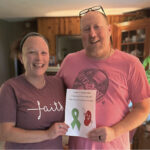 The human digestive tract plays a vital role in our lives and well-being, but we often have an uncomfortable reaction when it comes to discussing it.
The human digestive tract plays a vital role in our lives and well-being, but we often have an uncomfortable reaction when it comes to discussing it.
Doctors, cancer organizations and others are working to break down barriers such as embarrassment and the “ick factor” to encourage open communication about the colon and rectum, the cancers that can affect them, and important screening tools like colonoscopy.
“Be proud and confident in knowing what’s normal for your body, checking your stool for signs of cancer and getting the appropriate screenings,” said Robert Carman Jr., doctor of osteopathic at Central Pennsylvania Surgical Associates. “I guarantee your doctor has seen and heard it all, so be honest if you have concerns. There’s no place for embarrassment when it comes to saving your life.”
According to the American Cancer Society, early detection and treatment does save lives. When caught early, colon cancer has a 90 percent cure rate, but the right screenings can actually prevent cancer from occurring.
“Colorectal cancer usually develops from pre-cancerous polyps called adenomatous polyps or serrated polyps,” said Carman. “So, in order to reduce the likelihood of colorectal cancer, it is important to have regular checkups and screening to find out if you have polyps and to have them removed if you do.”
The U.S. Preventive Services Task Force recommends screening for colorectal cancer using high-sensitivity fecal occult blood testing, sigmoidoscopy or colonoscopy beginning at age 50 and continuing until age 75. People at higher risk of developing colorectal cancer should begin screening at a younger age and may need to be tested more frequently.
“It is very important to understand that younger people can get colon cancer,” said Carman. “You should be screened before age 50 if you have symptoms such as abdominal or rectal pain, bleeding, change in bowel habits, or a family history of colon or rectal cancer or polyps. If you have a family history of colon cancer, you should be screened 10 years earlier than the age of the family member when he or she was diagnosed, or at age 40—whichever is younger.”
Most people have heard of colonoscopy, a procedure that examines the colon by use of a long, flexible, lighted tube called the colonoscope. Through it, the doctor can view the entire colon and rectum for polyps or cancer. During this same exam, the doctor also can remove pre-cancerous polyps. Because it is the only method that combines both screening and prevention (by removal of pre-cancerous polyps), most gastroenterologists and surgeons recommend colonoscopy as the single best screening exam for colorectal cancer.
“The procedure itself takes about 45 minutes and usually involves sedation, so it’s rarely uncomfortable,” said Carman. “Patients are asked to switch to a clear-liquid diet the day before and use laxatives or a cleansing preparation. The colon must be completely clean for the procedure to be accurate and comprehensive.”
While the cleansing process isn’t pleasant, most gastroenterologists agree that it’s well worth any temporary discomfort to protect your health and your life. When your doctor recommends your cleansing procedure, he or she will account for any medications you take and any health problems you have.
“Right now, only about 60 percent of people who should be screened are getting screened,” said Carman. “Colorectal cancer is the second leading cause of cancer-related deaths for both sexes combined. With the appropriate screening tests, we can significantly reduce that number, detect their cancer earlier and decrease the number of colorectal cancer deaths.”
Lifestyle changes also can reduce the risk of colon cancer. Carman recommends eating more foods that are high in fiber, including whole grains, fruits, vegetables and more cruciferous vegetables, such as cabbage, broccoli, cauliflower and Brussels sprouts.
Increasing calcium intake with low-fat milk, shellfish, salmon and calcium supplements with vitamin D—and decreasing consumption of fats, oils, butter and red meats—are other recommended dietary changes. And, as with all cancers, regular exercise, not smoking and maintaining a normal weight may also reduce your risk.
Patients can also play an active role in their health by choosing the right physician for the colonoscopy procedure.
“I recommend a physician who is board-certified and performs the procedure in a licensed, accredited facility with the appropriate preparation, sedation and monitoring,” said Dr. Carman. “If you’re unsure, ask your primary care doctor for a recommendation, but do your research about experience and credentials.”
Properly administered, colorectal cancer screening is safe and effective, Carman said.
“More than one-third of colorectal cancer deaths could be avoided if all eligible individuals participated in regular screening,” he said. “Take charge of your health and don’t let fear hold you back from getting screened.”





